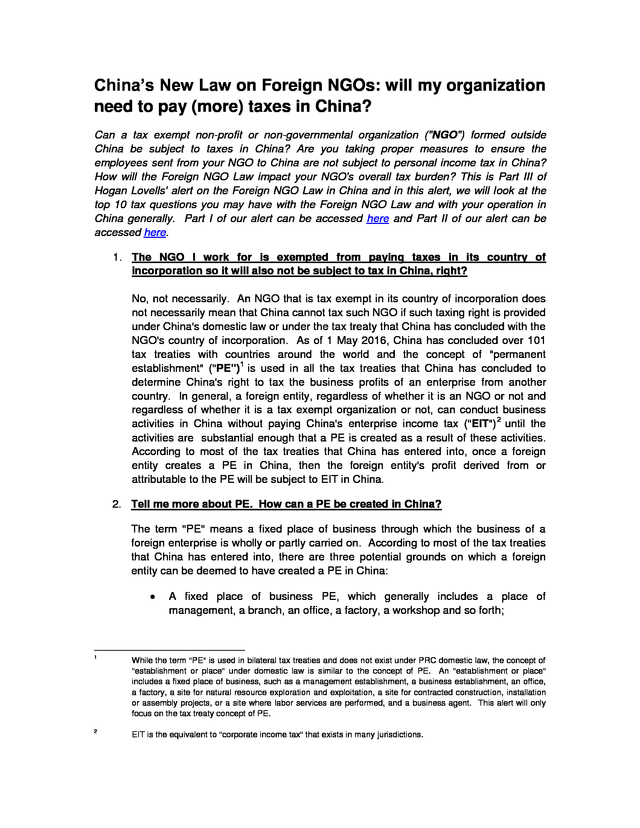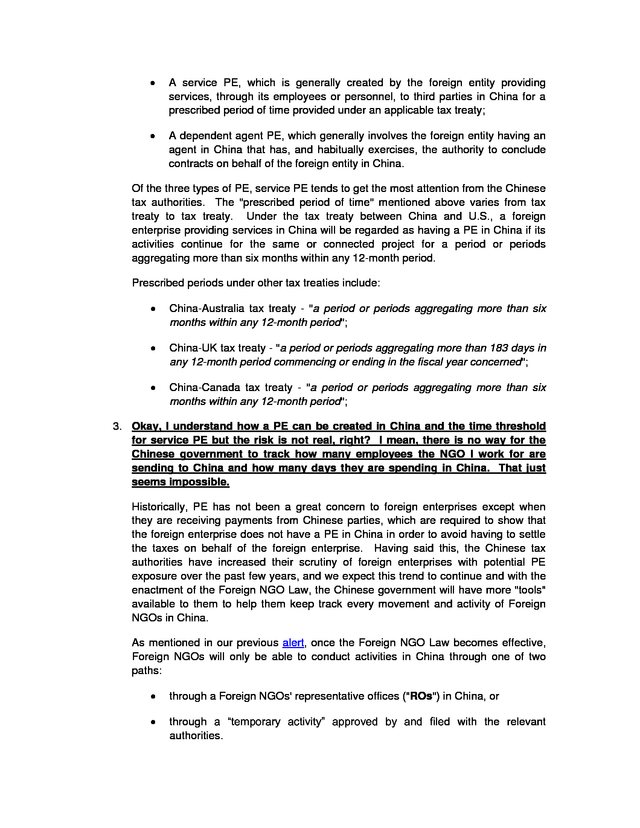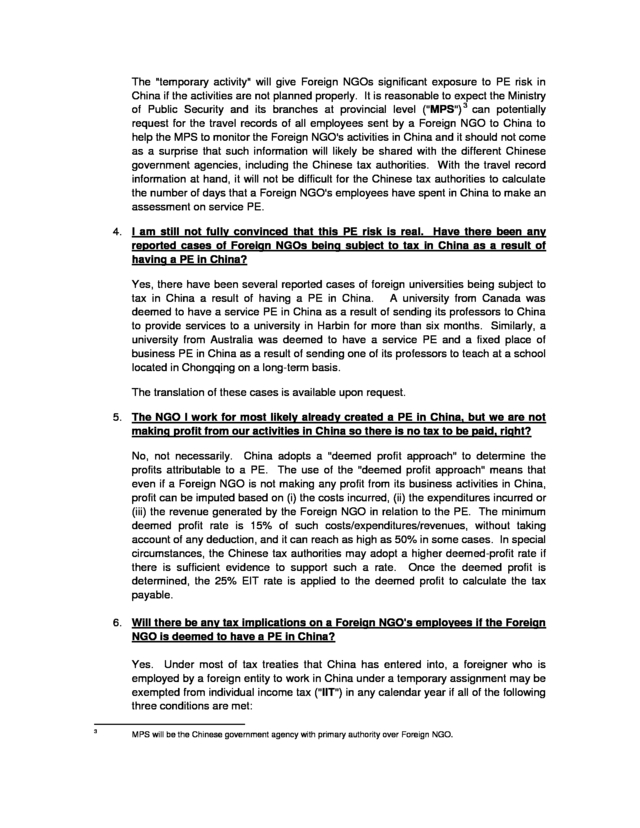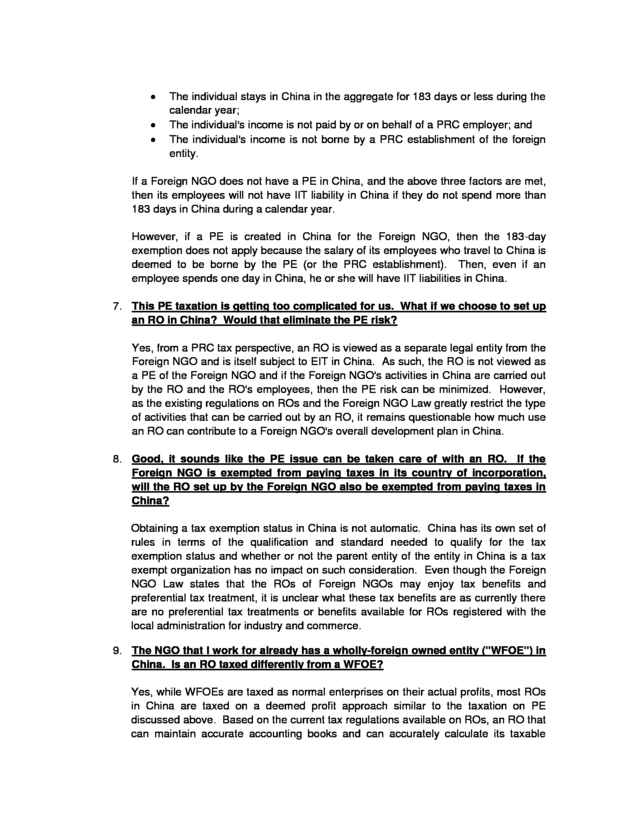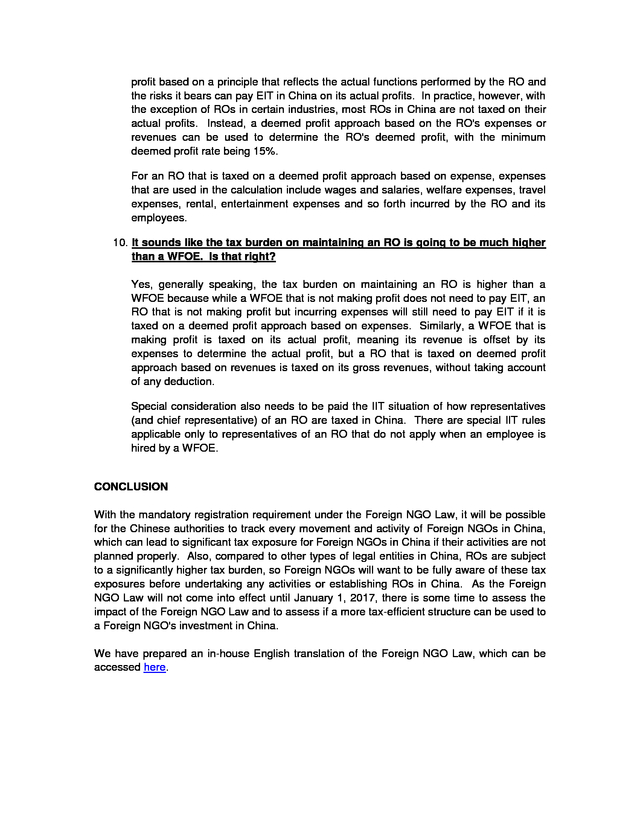Description
China’s New Law on Foreign NGOs: will my organization
need to pay (more) taxes in China?
Can a tax exempt non-profit or non-governmental organization ("NGO") formed outside
China be subject to taxes in China? Are you taking proper measures to ensure the
employees sent from your NGO to China are not subject to personal income tax in China?
How will the Foreign NGO Law impact your NGO's overall tax burden? This is Part III of
Hogan Lovells' alert on the Foreign NGO Law in China and in this alert, we will look at the
top 10 tax questions you may have with the Foreign NGO Law and with your operation in
China generally. Part I of our alert can be accessed here and Part II of our alert can be
accessed here.
1. The NGO I work for is exempted from paying taxes in its country of
incorporation so it will also not be subject to tax in China, right?
No, not necessarily. An NGO that is tax exempt in its country of incorporation does
not necessarily mean that China cannot tax such NGO if such taxing right is provided
under China's domestic law or under the tax treaty that China has concluded with the
NGO's country of incorporation.
As of 1 May 2016, China has concluded over 101 tax treaties with countries around the world and the concept of "permanent establishment" ("PE")1 is used in all the tax treaties that China has concluded to determine China's right to tax the business profits of an enterprise from another country. In general, a foreign entity, regardless of whether it is an NGO or not and regardless of whether it is a tax exempt organization or not, can conduct business activities in China without paying China's enterprise income tax ("EIT") 2 until the activities are substantial enough that a PE is created as a result of these activities. According to most of the tax treaties that China has entered into, once a foreign entity creates a PE in China, then the foreign entity's profit derived from or attributable to the PE will be subject to EIT in China. 2. Tell me more about PE.
How can a PE be created in China? The term "PE" means a fixed place of business through which the business of a foreign enterprise is wholly or partly carried on. According to most of the tax treaties that China has entered into, there are three potential grounds on which a foreign entity can be deemed to have created a PE in China: ï‚· A fixed place of business PE, which generally includes a place of management, a branch, an office, a factory, a workshop and so forth; 1 While the term "PE" is used in bilateral tax treaties and does not exist under PRC domestic law, the concept of "establishment or place" under domestic law is similar to the concept of PE. An "establishment or place" includes a fixed place of business, such as a management establishment, a business establishment, an office, a factory, a site for natural resource exploration and exploitation, a site for contracted construction, installation or assembly projects, or a site where labor services are performed, and a business agent.
This alert will only focus on the tax treaty concept of PE. 2 EIT is the equivalent to "corporate income tax" that exists in many jurisdictions. . ï‚· A service PE, which is generally created by the foreign entity providing services, through its employees or personnel, to third parties in China for a prescribed period of time provided under an applicable tax treaty; ï‚· A dependent agent PE, which generally involves the foreign entity having an agent in China that has, and habitually exercises, the authority to conclude contracts on behalf of the foreign entity in China. Of the three types of PE, service PE tends to get the most attention from the Chinese tax authorities. The "prescribed period of time" mentioned above varies from tax treaty to tax treaty. Under the tax treaty between China and U.S., a foreign enterprise providing services in China will be regarded as having a PE in China if its activities continue for the same or connected project for a period or periods aggregating more than six months within any 12-month period. Prescribed periods under other tax treaties include: ï‚· China-Australia tax treaty - "a period or periods aggregating more than six months within any 12-month period"; ï‚· China-UK tax treaty - "a period or periods aggregating more than 183 days in any 12-month period commencing or ending in the fiscal year concerned"; ï‚· China-Canada tax treaty - "a period or periods aggregating more than six months within any 12-month period"; 3. Okay, I understand how a PE can be created in China and the time threshold for service PE but the risk is not real, right? I mean, there is no way for the Chinese government to track how many employees the NGO I work for are sending to China and how many days they are spending in China.
That just seems impossible. Historically, PE has not been a great concern to foreign enterprises except when they are receiving payments from Chinese parties, which are required to show that the foreign enterprise does not have a PE in China in order to avoid having to settle the taxes on behalf of the foreign enterprise. Having said this, the Chinese tax authorities have increased their scrutiny of foreign enterprises with potential PE exposure over the past few years, and we expect this trend to continue and with the enactment of the Foreign NGO Law, the Chinese government will have more "tools" available to them to help them keep track every movement and activity of Foreign NGOs in China. As mentioned in our previous alert, once the Foreign NGO Law becomes effective, Foreign NGOs will only be able to conduct activities in China through one of two paths: ï‚· through a Foreign NGOs' representative offices ("ROs") in China, or ï‚· through a “temporary activity” approved by and filed with the relevant authorities. . The "temporary activity" will give Foreign NGOs significant exposure to PE risk in China if the activities are not planned properly. It is reasonable to expect the Ministry of Public Security and its branches at provincial level ("MPS") 3 can potentially request for the travel records of all employees sent by a Foreign NGO to China to help the MPS to monitor the Foreign NGO's activities in China and it should not come as a surprise that such information will likely be shared with the different Chinese government agencies, including the Chinese tax authorities. With the travel record information at hand, it will not be difficult for the Chinese tax authorities to calculate the number of days that a Foreign NGO's employees have spent in China to make an assessment on service PE. 4. I am still not fully convinced that this PE risk is real.
Have there been any reported cases of Foreign NGOs being subject to tax in China as a result of having a PE in China? Yes, there have been several reported cases of foreign universities being subject to tax in China a result of having a PE in China. A university from Canada was deemed to have a service PE in China as a result of sending its professors to China to provide services to a university in Harbin for more than six months. Similarly, a university from Australia was deemed to have a service PE and a fixed place of business PE in China as a result of sending one of its professors to teach at a school located in Chongqing on a long-term basis. The translation of these cases is available upon request. 5.
The NGO I work for most likely already created a PE in China, but we are not making profit from our activities in China so there is no tax to be paid, right? No, not necessarily. China adopts a "deemed profit approach" to determine the profits attributable to a PE. The use of the "deemed profit approach" means that even if a Foreign NGO is not making any profit from its business activities in China, profit can be imputed based on (i) the costs incurred, (ii) the expenditures incurred or (iii) the revenue generated by the Foreign NGO in relation to the PE.
The minimum deemed profit rate is 15% of such costs/expenditures/revenues, without taking account of any deduction, and it can reach as high as 50% in some cases. In special circumstances, the Chinese tax authorities may adopt a higher deemed-profit rate if there is sufficient evidence to support such a rate. Once the deemed profit is determined, the 25% EIT rate is applied to the deemed profit to calculate the tax payable. 6.
Will there be any tax implications on a Foreign NGO's employees if the Foreign NGO is deemed to have a PE in China? Yes. Under most of tax treaties that China has entered into, a foreigner who is employed by a foreign entity to work in China under a temporary assignment may be exempted from individual income tax ("IIT") in any calendar year if all of the following three conditions are met: 3 MPS will be the Chinese government agency with primary authority over Foreign NGO. . ï‚· ï‚· ï‚· The individual stays in China in the aggregate for 183 days or less during the calendar year; The individual's income is not paid by or on behalf of a PRC employer; and The individual's income is not borne by a PRC establishment of the foreign entity. If a Foreign NGO does not have a PE in China, and the above three factors are met, then its employees will not have IIT liability in China if they do not spend more than 183 days in China during a calendar year. However, if a PE is created in China for the Foreign NGO, then the 183-day exemption does not apply because the salary of its employees who travel to China is deemed to be borne by the PE (or the PRC establishment). Then, even if an employee spends one day in China, he or she will have IIT liabilities in China. 7. This PE taxation is getting too complicated for us. What if we choose to set up an RO in China? Would that eliminate the PE risk? Yes, from a PRC tax perspective, an RO is viewed as a separate legal entity from the Foreign NGO and is itself subject to EIT in China.
As such, the RO is not viewed as a PE of the Foreign NGO and if the Foreign NGO's activities in China are carried out by the RO and the RO's employees, then the PE risk can be minimized. However, as the existing regulations on ROs and the Foreign NGO Law greatly restrict the type of activities that can be carried out by an RO, it remains questionable how much use an RO can contribute to a Foreign NGO's overall development plan in China. 8. Good, it sounds like the PE issue can be taken care of with an RO.
If the Foreign NGO is exempted from paying taxes in its country of incorporation, will the RO set up by the Foreign NGO also be exempted from paying taxes in China? Obtaining a tax exemption status in China is not automatic. China has its own set of rules in terms of the qualification and standard needed to qualify for the tax exemption status and whether or not the parent entity of the entity in China is a tax exempt organization has no impact on such consideration. Even though the Foreign NGO Law states that the ROs of Foreign NGOs may enjoy tax benefits and preferential tax treatment, it is unclear what these tax benefits are as currently there are no preferential tax treatments or benefits available for ROs registered with the local administration for industry and commerce. 9.
The NGO that I work for already has a wholly-foreign owned entity ("WFOE") in China. Is an RO taxed differently from a WFOE? Yes, while WFOEs are taxed as normal enterprises on their actual profits, most ROs in China are taxed on a deemed profit approach similar to the taxation on PE discussed above. Based on the current tax regulations available on ROs, an RO that can maintain accurate accounting books and can accurately calculate its taxable .
profit based on a principle that reflects the actual functions performed by the RO and the risks it bears can pay EIT in China on its actual profits. In practice, however, with the exception of ROs in certain industries, most ROs in China are not taxed on their actual profits. Instead, a deemed profit approach based on the RO's expenses or revenues can be used to determine the RO's deemed profit, with the minimum deemed profit rate being 15%. For an RO that is taxed on a deemed profit approach based on expense, expenses that are used in the calculation include wages and salaries, welfare expenses, travel expenses, rental, entertainment expenses and so forth incurred by the RO and its employees. 10. It sounds like the tax burden on maintaining an RO is going to be much higher than a WFOE.
Is that right? Yes, generally speaking, the tax burden on maintaining an RO is higher than a WFOE because while a WFOE that is not making profit does not need to pay EIT, an RO that is not making profit but incurring expenses will still need to pay EIT if it is taxed on a deemed profit approach based on expenses. Similarly, a WFOE that is making profit is taxed on its actual profit, meaning its revenue is offset by its expenses to determine the actual profit, but a RO that is taxed on deemed profit approach based on revenues is taxed on its gross revenues, without taking account of any deduction. Special consideration also needs to be paid the IIT situation of how representatives (and chief representative) of an RO are taxed in China. There are special IIT rules applicable only to representatives of an RO that do not apply when an employee is hired by a WFOE. CONCLUSION With the mandatory registration requirement under the Foreign NGO Law, it will be possible for the Chinese authorities to track every movement and activity of Foreign NGOs in China, which can lead to significant tax exposure for Foreign NGOs in China if their activities are not planned properly.
Also, compared to other types of legal entities in China, ROs are subject to a significantly higher tax burden, so Foreign NGOs will want to be fully aware of these tax exposures before undertaking any activities or establishing ROs in China. As the Foreign NGO Law will not come into effect until January 1, 2017, there is some time to assess the impact of the Foreign NGO Law and to assess if a more tax-efficient structure can be used to a Foreign NGO's investment in China. We have prepared an in-house English translation of the Foreign NGO Law, which can be accessed here. .
As of 1 May 2016, China has concluded over 101 tax treaties with countries around the world and the concept of "permanent establishment" ("PE")1 is used in all the tax treaties that China has concluded to determine China's right to tax the business profits of an enterprise from another country. In general, a foreign entity, regardless of whether it is an NGO or not and regardless of whether it is a tax exempt organization or not, can conduct business activities in China without paying China's enterprise income tax ("EIT") 2 until the activities are substantial enough that a PE is created as a result of these activities. According to most of the tax treaties that China has entered into, once a foreign entity creates a PE in China, then the foreign entity's profit derived from or attributable to the PE will be subject to EIT in China. 2. Tell me more about PE.
How can a PE be created in China? The term "PE" means a fixed place of business through which the business of a foreign enterprise is wholly or partly carried on. According to most of the tax treaties that China has entered into, there are three potential grounds on which a foreign entity can be deemed to have created a PE in China: ï‚· A fixed place of business PE, which generally includes a place of management, a branch, an office, a factory, a workshop and so forth; 1 While the term "PE" is used in bilateral tax treaties and does not exist under PRC domestic law, the concept of "establishment or place" under domestic law is similar to the concept of PE. An "establishment or place" includes a fixed place of business, such as a management establishment, a business establishment, an office, a factory, a site for natural resource exploration and exploitation, a site for contracted construction, installation or assembly projects, or a site where labor services are performed, and a business agent.
This alert will only focus on the tax treaty concept of PE. 2 EIT is the equivalent to "corporate income tax" that exists in many jurisdictions. . ï‚· A service PE, which is generally created by the foreign entity providing services, through its employees or personnel, to third parties in China for a prescribed period of time provided under an applicable tax treaty; ï‚· A dependent agent PE, which generally involves the foreign entity having an agent in China that has, and habitually exercises, the authority to conclude contracts on behalf of the foreign entity in China. Of the three types of PE, service PE tends to get the most attention from the Chinese tax authorities. The "prescribed period of time" mentioned above varies from tax treaty to tax treaty. Under the tax treaty between China and U.S., a foreign enterprise providing services in China will be regarded as having a PE in China if its activities continue for the same or connected project for a period or periods aggregating more than six months within any 12-month period. Prescribed periods under other tax treaties include: ï‚· China-Australia tax treaty - "a period or periods aggregating more than six months within any 12-month period"; ï‚· China-UK tax treaty - "a period or periods aggregating more than 183 days in any 12-month period commencing or ending in the fiscal year concerned"; ï‚· China-Canada tax treaty - "a period or periods aggregating more than six months within any 12-month period"; 3. Okay, I understand how a PE can be created in China and the time threshold for service PE but the risk is not real, right? I mean, there is no way for the Chinese government to track how many employees the NGO I work for are sending to China and how many days they are spending in China.
That just seems impossible. Historically, PE has not been a great concern to foreign enterprises except when they are receiving payments from Chinese parties, which are required to show that the foreign enterprise does not have a PE in China in order to avoid having to settle the taxes on behalf of the foreign enterprise. Having said this, the Chinese tax authorities have increased their scrutiny of foreign enterprises with potential PE exposure over the past few years, and we expect this trend to continue and with the enactment of the Foreign NGO Law, the Chinese government will have more "tools" available to them to help them keep track every movement and activity of Foreign NGOs in China. As mentioned in our previous alert, once the Foreign NGO Law becomes effective, Foreign NGOs will only be able to conduct activities in China through one of two paths: ï‚· through a Foreign NGOs' representative offices ("ROs") in China, or ï‚· through a “temporary activity” approved by and filed with the relevant authorities. . The "temporary activity" will give Foreign NGOs significant exposure to PE risk in China if the activities are not planned properly. It is reasonable to expect the Ministry of Public Security and its branches at provincial level ("MPS") 3 can potentially request for the travel records of all employees sent by a Foreign NGO to China to help the MPS to monitor the Foreign NGO's activities in China and it should not come as a surprise that such information will likely be shared with the different Chinese government agencies, including the Chinese tax authorities. With the travel record information at hand, it will not be difficult for the Chinese tax authorities to calculate the number of days that a Foreign NGO's employees have spent in China to make an assessment on service PE. 4. I am still not fully convinced that this PE risk is real.
Have there been any reported cases of Foreign NGOs being subject to tax in China as a result of having a PE in China? Yes, there have been several reported cases of foreign universities being subject to tax in China a result of having a PE in China. A university from Canada was deemed to have a service PE in China as a result of sending its professors to China to provide services to a university in Harbin for more than six months. Similarly, a university from Australia was deemed to have a service PE and a fixed place of business PE in China as a result of sending one of its professors to teach at a school located in Chongqing on a long-term basis. The translation of these cases is available upon request. 5.
The NGO I work for most likely already created a PE in China, but we are not making profit from our activities in China so there is no tax to be paid, right? No, not necessarily. China adopts a "deemed profit approach" to determine the profits attributable to a PE. The use of the "deemed profit approach" means that even if a Foreign NGO is not making any profit from its business activities in China, profit can be imputed based on (i) the costs incurred, (ii) the expenditures incurred or (iii) the revenue generated by the Foreign NGO in relation to the PE.
The minimum deemed profit rate is 15% of such costs/expenditures/revenues, without taking account of any deduction, and it can reach as high as 50% in some cases. In special circumstances, the Chinese tax authorities may adopt a higher deemed-profit rate if there is sufficient evidence to support such a rate. Once the deemed profit is determined, the 25% EIT rate is applied to the deemed profit to calculate the tax payable. 6.
Will there be any tax implications on a Foreign NGO's employees if the Foreign NGO is deemed to have a PE in China? Yes. Under most of tax treaties that China has entered into, a foreigner who is employed by a foreign entity to work in China under a temporary assignment may be exempted from individual income tax ("IIT") in any calendar year if all of the following three conditions are met: 3 MPS will be the Chinese government agency with primary authority over Foreign NGO. . ï‚· ï‚· ï‚· The individual stays in China in the aggregate for 183 days or less during the calendar year; The individual's income is not paid by or on behalf of a PRC employer; and The individual's income is not borne by a PRC establishment of the foreign entity. If a Foreign NGO does not have a PE in China, and the above three factors are met, then its employees will not have IIT liability in China if they do not spend more than 183 days in China during a calendar year. However, if a PE is created in China for the Foreign NGO, then the 183-day exemption does not apply because the salary of its employees who travel to China is deemed to be borne by the PE (or the PRC establishment). Then, even if an employee spends one day in China, he or she will have IIT liabilities in China. 7. This PE taxation is getting too complicated for us. What if we choose to set up an RO in China? Would that eliminate the PE risk? Yes, from a PRC tax perspective, an RO is viewed as a separate legal entity from the Foreign NGO and is itself subject to EIT in China.
As such, the RO is not viewed as a PE of the Foreign NGO and if the Foreign NGO's activities in China are carried out by the RO and the RO's employees, then the PE risk can be minimized. However, as the existing regulations on ROs and the Foreign NGO Law greatly restrict the type of activities that can be carried out by an RO, it remains questionable how much use an RO can contribute to a Foreign NGO's overall development plan in China. 8. Good, it sounds like the PE issue can be taken care of with an RO.
If the Foreign NGO is exempted from paying taxes in its country of incorporation, will the RO set up by the Foreign NGO also be exempted from paying taxes in China? Obtaining a tax exemption status in China is not automatic. China has its own set of rules in terms of the qualification and standard needed to qualify for the tax exemption status and whether or not the parent entity of the entity in China is a tax exempt organization has no impact on such consideration. Even though the Foreign NGO Law states that the ROs of Foreign NGOs may enjoy tax benefits and preferential tax treatment, it is unclear what these tax benefits are as currently there are no preferential tax treatments or benefits available for ROs registered with the local administration for industry and commerce. 9.
The NGO that I work for already has a wholly-foreign owned entity ("WFOE") in China. Is an RO taxed differently from a WFOE? Yes, while WFOEs are taxed as normal enterprises on their actual profits, most ROs in China are taxed on a deemed profit approach similar to the taxation on PE discussed above. Based on the current tax regulations available on ROs, an RO that can maintain accurate accounting books and can accurately calculate its taxable .
profit based on a principle that reflects the actual functions performed by the RO and the risks it bears can pay EIT in China on its actual profits. In practice, however, with the exception of ROs in certain industries, most ROs in China are not taxed on their actual profits. Instead, a deemed profit approach based on the RO's expenses or revenues can be used to determine the RO's deemed profit, with the minimum deemed profit rate being 15%. For an RO that is taxed on a deemed profit approach based on expense, expenses that are used in the calculation include wages and salaries, welfare expenses, travel expenses, rental, entertainment expenses and so forth incurred by the RO and its employees. 10. It sounds like the tax burden on maintaining an RO is going to be much higher than a WFOE.
Is that right? Yes, generally speaking, the tax burden on maintaining an RO is higher than a WFOE because while a WFOE that is not making profit does not need to pay EIT, an RO that is not making profit but incurring expenses will still need to pay EIT if it is taxed on a deemed profit approach based on expenses. Similarly, a WFOE that is making profit is taxed on its actual profit, meaning its revenue is offset by its expenses to determine the actual profit, but a RO that is taxed on deemed profit approach based on revenues is taxed on its gross revenues, without taking account of any deduction. Special consideration also needs to be paid the IIT situation of how representatives (and chief representative) of an RO are taxed in China. There are special IIT rules applicable only to representatives of an RO that do not apply when an employee is hired by a WFOE. CONCLUSION With the mandatory registration requirement under the Foreign NGO Law, it will be possible for the Chinese authorities to track every movement and activity of Foreign NGOs in China, which can lead to significant tax exposure for Foreign NGOs in China if their activities are not planned properly.
Also, compared to other types of legal entities in China, ROs are subject to a significantly higher tax burden, so Foreign NGOs will want to be fully aware of these tax exposures before undertaking any activities or establishing ROs in China. As the Foreign NGO Law will not come into effect until January 1, 2017, there is some time to assess the impact of the Foreign NGO Law and to assess if a more tax-efficient structure can be used to a Foreign NGO's investment in China. We have prepared an in-house English translation of the Foreign NGO Law, which can be accessed here. .



